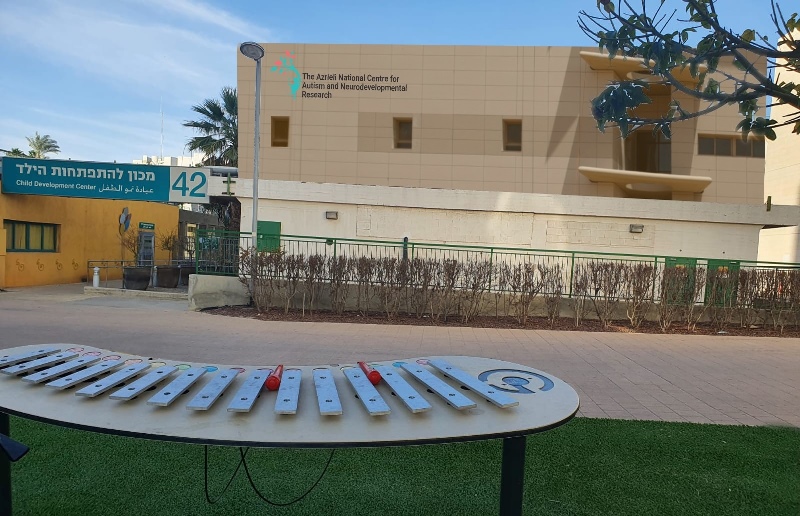The
Azrieli Foundation
recently announced a donation in the amount of NIS 40 million to the National Autism Research Centre of
Israel (NARCI), a unique collaboration between scientists from Ben-Gurion University of the Negev (BGU)
and clinicians from Soroka
University Medical Center (SUMC). The center, originally
established by the Israeli Ministry of Science and Technology, is dedicated to
translational research that will revolutionize diagnosis techniques and
interventions for autism and other neurodevelopmental conditions. In honour of
this generous donation, the centre has proudly been renamed The Azrieli National Centre for Autism
and Neurodevelopment Research.

Ben-Gurion University
President Prof. Daniel Chamovitz, "The Azrieli National
Centre for Autism and Neurodevelopment Research is a quintessential BGU
project. Innovative, cutting-edge, and super-disciplinary, designed to make
world-class discoveries while providing critical support and hope to families.
The Azrieli Foundation has been our partner on a number of innovative
initiatives, and we are grateful that they recognize our unique vision."
Naomi Azrieli, Chair and
CEO of the Azrieli Foundation, explains why the Foundation
invested in the center. “Neurodevelopmental research and supporting people with
neurodevelopmental disabilities is one of our core priorities. We help people
maximize their potential by connecting them to resources, expertise, and
education, and the Azrieli National Centre for Autism and Neurodevelopment
Research will do exactly that – by building and nurturing networks that enable
research and innovative technology.”
Danna Azrieli, Chair of
The Azrieli Group and the Azrieli Foundation Israel:" We
are delighted to join forces with Ben-Gurion University, a top-rated global
institution, which has developed groundbreaking research studies and innovative
technology. Ben-Gurion University and the City of Beer-Sheva are especially
close to our heart, as it is our goal to further help develop the Negev and
create more opportunities in the area. It is our biggest wish to see the Negev
flourish by developing its educational systems, academic facilities, and its
health services, all in the hope of creating an inclusive and equal society in
Israel."
Prof. Ilan Dinstein,
Director of The Azrieli National Centre for Autism and Neurodevelopmental
Research and a member of the Departments of Psychology and Cognitive &
Brain Sciences explains how the donation from the Azrieli
Foundation will help to advance the invaluable work currently performed at the
centre. “Our research has demonstrated that autism is actually a family of
multiple disorders, with a variety of symptoms that are caused by different
reasons. The big challenge is to determine how many types of autism there are,
how to best identify them early, and most importantly, what interventions work
best for each type. To determine this, scientists have to partner with
clinicians and study large numbers of children with autism over extended
periods of time. The Azrieli Foundation contribution will enable us to do this
on a national scale, by building a system of national sites in leading clinical
centers where autism is diagnosed and treated. This extensive data collection
effort will be matched by an extensive data-sharing effort that will enable
multiple labs in all academic centers across Israel to study the disorder and
advance the discovery of new diagnostic techniques and interventions.”
The six-year plan will vastly expand the centre and its reach.
A dedicated facility inside SUMC will be constructed that will double the space
for working with ASD children and performing cutting-edge research. It will
house state-of-the-art genetics/bioinformatics, biomarker-detection, and
neuroimaging labs, which will process collected samples/data and provide
services to autism researchers throughout the country.
Dr. Gal Meiri, Director of
The Child and Adolescent Psychiatry Department at SUMC and medical director of
the centre described the great excitement regarding the
development of the centre. “We truly believe that combining clinical and
scientific excellence will lead to critical breakthroughs in the way we
currently diagnose and treat children with autism. We see this daily in the
clinic where the use of research tools as part of the diagnosis and follow-up
procedures improves the quality of clinical care that we are giving the
children and their families. Today, we give families much more information
about their child’s symptoms as well as their genetics. The Azrieli support
will further enhance this effort and enable us to create a national network of
sites that will yield not only ground-breaking research but also improve
autism diagnostic services throughout the country.”
Existing data collection will be expanded to multiple autism clinics throughout
Israel, where multiple types of clinical and behavioral data, biological
samples (e.g., DNA and blood samples), and neuroimaging data will be collected.
This data collection will enable the rapid expansion of the National Autism
Database, which will triple in size within five years. New faculty members,
post-docs, and graduate students, as well as scientific, clinical, technical,
and administrative support staff will be recruited to manage this extensive
data collection and sharing effort.
In addition to developing the extensive autism research infrastructure
described above, the centre is also leading the development of a national
autism research community by means of hosting an annual national autism
research conference, periodic workshops from leading autism researchers
throughout the world, and by dispensing seed funding for research projects that
utilize the centre's data and/or infrastructure.
“We are extremely fortunate and grateful to be on the receiving end of such a
generous donation from a world-renowned organization like The Azrieli
Foundation,” says Mark
Mendelson, CEO of Canadian Associates of Ben-Gurion University.
“This donation will enable world-class researchers at BGU to further explore
the intricacies of Autism, allowing them to create and innovate new
interventions, medications, and solutions for people living with this disorder.”
Media Coverage:
The Times of Israel
The Canadian Jewish News